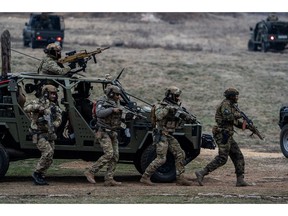
Article content
(Bloomberg) — Europe could spend as much as €14 trillion ($16 trillion) on defense and related infrastructure over the next decade, creating a major opportunity for private capital, according to buyout firm Carlyle Group Inc.
THIS CONTENT IS RESERVED FOR SUBSCRIBERS ONLY
Subscribe now to read the latest news in your city and across Canada.
- Exclusive articles from Barbara Shecter, Joe O'Connor, Gabriel Friedman, and others.
- Daily content from Financial Times, the world's leading global business publication.
- Unlimited online access to read articles from Financial Post, National Post and 15 news sites across Canada with one account.
- National Post ePaper, an electronic replica of the print edition to view on any device, share and comment on.
- Daily puzzles, including the New York Times Crossword.
SUBSCRIBE TO UNLOCK MORE ARTICLES
Subscribe now to read the latest news in your city and across Canada.
- Exclusive articles from Barbara Shecter, Joe O'Connor, Gabriel Friedman and others.
- Daily content from Financial Times, the world's leading global business publication.
- Unlimited online access to read articles from Financial Post, National Post and 15 news sites across Canada with one account.
- National Post ePaper, an electronic replica of the print edition to view on any device, share and comment on.
- Daily puzzles, including the New York Times Crossword.
REGISTER / SIGN IN TO UNLOCK MORE ARTICLES
Create an account or sign in to continue with your reading experience.
- Access articles from across Canada with one account.
- Share your thoughts and join the conversation in the comments.
- Enjoy additional articles per month.
- Get email updates from your favourite authors.
THIS ARTICLE IS FREE TO READ REGISTER TO UNLOCK.
Create an account or sign in to continue with your reading experience.
- Access articles from across Canada with one account
- Share your thoughts and join the conversation in the comments
- Enjoy additional articles per month
- Get email updates from your favourite authors
Sign In or Create an Account
or
Article content
Defense investments could soar from current projections of €4 trillion if European countries agree to proposed NATO spending targets of 5% of gross domestic product, Carlyle wrote in a report Tuesday on the eve of this week’s NATO summit. The longer-term benefits to the economy could be even more significant than the China boom that followed the Asian nation’s opening up to the world.
Article content
Article content
Article content
Under pressure from Russian President Vladimir Putin in the east and Donald Trump to the west, European countries are preparing to ramp up spending to eyewatering levels. NATO Secretary-General Mark Rutte is pushing members to agree to commit to spending 3.5% on core defense activity and another 1.5% on related areas like cybersecurity ahead of Tuesday’s summit in The Hague.
Article content
By signing up you consent to receive the above newsletter from Postmedia Network Inc.
Article content
“There’s going to be a big increase in the demand for capital to start getting these projects up and going,” Jeff Currie, chief strategy officer of energy pathways at Carlyle, said in an interview. “There’s going to be a lot of investment opportunities.”
Article content
Carlyle’s pitch for the role of private capital echoes similar messaging from the European Commission, which published a white paper in March on an €800 billion plan that included suggestions for mobilizing private money.
Article content
Spurring Innovation
Article content
Just as the birth of Silicon Valley and the internet are linked to American military priorities and private capital spending, Europe’s security needs can drive investments in innovation and infrastructure that end up benefiting the entire economy, Carlyle said.
Article content
Article content
Europe faces challenges such as the fragmentation of its defense industry, with competing national defense companies, fighter jet and tanks programs. But the success of European multinational planemaker Airbus SE and the MBDA missile venture shows that there can be successful collaboration.
Article content
“Battles are won with soldiers and weapons. Wars, however, are won with supply chains and money,” the report said. This is where private equity and venture capital funds could step in, according to Carlyle.
Article content
Carlyle suggested Europe needs to coordinate supply chains to provide standardized designs — like Lego bricks — for basic system components from chips to drones to overcome national rivalries and competing platforms.
Article content
Private Equity Role
Article content
A private equity firm can provide investment, expertise and a single intermediary to help governments build out the supply chain while avoiding the need to “micromanage,” according to the report. Europe should issue cross-border bonds to help fund the buildout, Currie said.
Article content
“It has to be a public-private partnership,” said Currie, who was previously global head of commodities research at Goldman Sachs Group Inc. “You don’t want to leave these types of projects to the vagaries of the publicly-traded markets, and you don’t want to completely let the bureaucrats control it. So the happy medium is the private space.”

.jpg) 7 hours ago
1
7 hours ago
1
 English (US)
English (US)